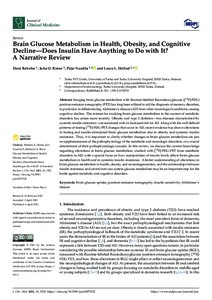Brain Glucose Metabolism in Health, Obesity, and Cognitive Decline-Does Insulin Have Anything to Do with It? A Narrative Review
Rebelos Eleni; Rinne Juha O; Nuutila Pirjo; Ekblad Laura L
Brain Glucose Metabolism in Health, Obesity, and Cognitive Decline-Does Insulin Have Anything to Do with It? A Narrative Review
Rebelos Eleni
Rinne Juha O
Nuutila Pirjo
Ekblad Laura L
MDPI
Julkaisun pysyvä osoite on:
https://urn.fi/URN:NBN:fi-fe2021093048647
https://urn.fi/URN:NBN:fi-fe2021093048647
Tiivistelmä
Imaging brain glucose metabolism with fluorine-labelled fluorodeoxyglucose ([F-18]-FDG) positron emission tomography (PET) has long been utilized to aid the diagnosis of memory disorders, in particular in differentiating Alzheimer's disease (AD) from other neurological conditions causing cognitive decline. The interest for studying brain glucose metabolism in the context of metabolic disorders has arisen more recently. Obesity and type 2 diabetes-two diseases characterized by systemic insulin resistance-are associated with an increased risk for AD. Along with the well-defined patterns of fasting [F-18]-FDG-PET changes that occur in AD, recent evidence has shown alterations in fasting and insulin-stimulated brain glucose metabolism also in obesity and systemic insulin resistance. Thus, it is important to clarify whether changes in brain glucose metabolism are just an epiphenomenon of the pathophysiology of the metabolic and neurologic disorders, or a crucial determinant of their pathophysiologic cascade. In this review, we discuss the current knowledge regarding alterations in brain glucose metabolism, studied with [F-18]-FDG-PET from metabolic disorders to AD, with a special focus on how manipulation of insulin levels affects brain glucose metabolism in health and in systemic insulin resistance. A better understanding of alterations in brain glucose metabolism in health, obesity, and neurodegeneration, and the relationships between insulin resistance and central nervous system glucose metabolism may be an important step for the battle against metabolic and cognitive disorders.
Kokoelmat
- Rinnakkaistallenteet [29337]
